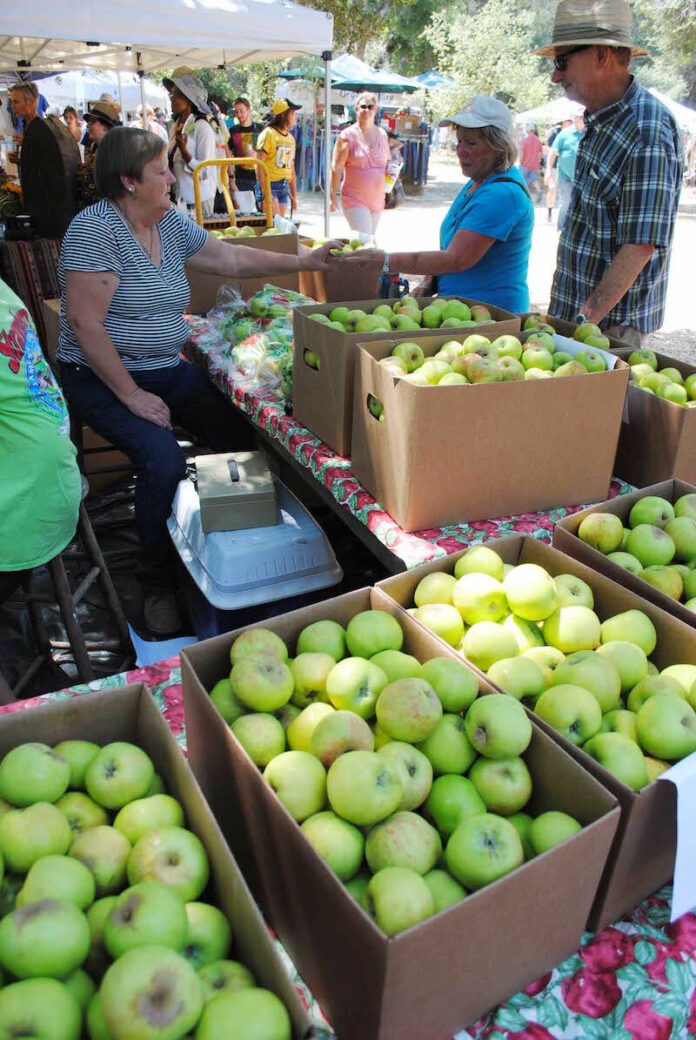
Sonoma County’s fabled Gravenstein apple trees don’t know there is a coronavirus pandemic and economic catastrophe going on right now. It’s early August so that means the 1,000 acres of apple orchards are now ready for picking. The tart and semi-sweet red, yellow and green striped apple that has a highway, a school, a health program, a restaurant and a summer fair named after it, is now the focal point of a COVID-19 pandemic “pop-up.”
With the annual Gravenstein Apple Fair now canceled, its original dates of Aug. 15 and 16 will be replaced by a drive-by purchase and pickup service, provided by volunteers and members of the Sonoma County Farm Trails. People are being encouraged to place online orders by Aug. 13 for various local products all made from Gravenstein apples. Then, orders will be pre-packed and ready for pickup between 11 a.m. and 3 p.m. at the Sebastopol Cultural and Community Center on Aug. 15 and 16. Farm Trails is calling the event “Grav & Go.”
The annual Gravenstein Fair, started in 1973, is the Farm Trails’ major fundraising event each year to support its small farm members cooperative marketing and promotion efforts throughout the year. A portion of the Grav & Go sales will be donated to the ag-focused nonprofit. For sale will be fresh Gravenstein apples, juice, apple sauce, apple butter, apple soap, Mom’s apple pies, Gravenstein apple cider and past Gravenstein Apple Fair memorabilia.
“Everything will be pre-packed and delivered with no-contact delivery,” said Carmen Snyder, Farm Trails’ executive director, who is working on a partial furlough these days. Orders can be placed online at https://www.farmtrails.org/grav-and-go.
Local farmers are reporting an average, to slightly light, apple crop this year, with the ripening season just about right on time. Full days of deliveries and processing are happening at Manzana Products in Graton, the county’s only remaining commercial apple processing plant. More than 90% of the Gravenstein crop is now farmed and processed organically. From its zenith during post World War II days when there were 16,000 acres of apple orchards on west county, last year’s official county crop report listed only 2,166 acres of apples, about half of them full of Gravenstein trees.
Farm Trails members rely on direct sales via from visits or at local farmers markets. This is the time of year when local farmers would be offering fresh vegetables, fruit, honey, flowers, jams and jellies and a new season of ciders, juices and butchered meats.
“Our restaurant members are getting hit the hardest, and we are rooting for them to make it. They have adapted creatively amidst the changing conditions and regulations, and we are doing our best to promote their offerings through our “Shelter in Place” portal on our website.” said Snyder, who urged everyone to support the local eateries and farmers who are part of an informal farm-to-table network dedicated to shopping, growing and eating locally.
“I think we will see new business models emerging from this (COVID-19 pandemic),” Snyder said, mentioning online orders and pre-registered farm visits instead of more open public hours. “We already know that people are coming to our pop-up from Sacramento and other places just to get their annual bag or boxes of fresh Gravensteins.
The heritage apple, grown commercially in Sonoma County since the 1880s and first planted here by Russian fur traders at Fort Ross on the Sonoma Coast, is favored for fresh eating and for pie making. It is described by devotees as both sweet and tart. Gravensteins are the earliest to ripen apples in North America, but are thin-skinned and difficult to ship or store. At Manzana, the Gravensteins are processed into organic juice, apple sauce and vinegar. A special assembly line squeezes the juice into foil packets destined for school cafeterias and grocery store shelves.







